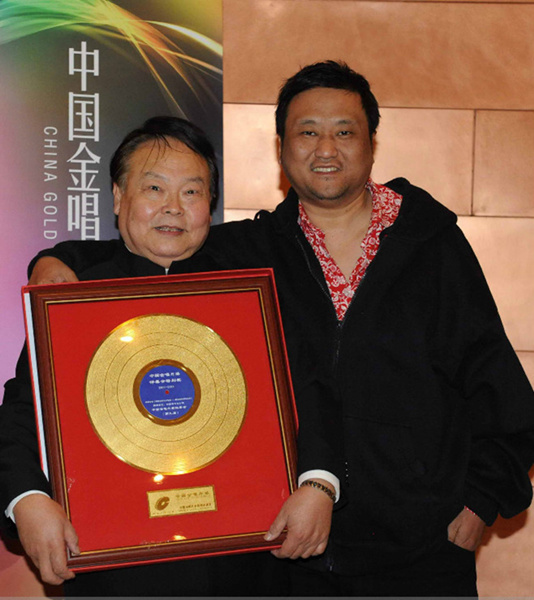|
 |
|
Liu Shiming and his godson Donald Li with a plate awarded for Liu's Music Album by China Record Corporation[Photo provided to chinadaily.com.cn] |
National becomes international
While his arias are some of the most highly rated in the mainland, Liu is also often asked to make recordings of quyi and folk songs. His godson Donald Li, a movie director who takes care of Liu in daily life, remembered that an art manager once told Liu, "Your voice could save many pieces of traditional music."
However, Liu's love of modern Chinese opera lingers. The style peaked in the 1960s when a slew of household operas were produced — such as Sister Jiangjie, Liu Hulan, The Song of the Prairie, Honghu Lake Brigade, and Red Cora — but fell out of favor until it enjoyed a revival in recent decades.
"The opera began its downturn after the ‘cultural revolution’ and one of the main reasons for its decline was the lack of quality composers," Liu said, who added that nowadays many Chinese composers are educated in the Western musical system, so the way they compose music is Westernized. Yet despite the differences in performance forms, the melody itself is the key that distinguishes Chinese opera from all others.
"The melody is Westernized; the singing is Westernized. How can we make our own opera?" Liu asked. He urged Chinese artists to cherish their cultural heritage, which is the key to making their work stand out in the global arena.
He feels even more strongly about performing Chinese music overseas, and joyfully recalled his experience, stressing "only what is national can be international".
He recounted that one of the most impressive performances he gave abroad was when he sang "The Ode" and "The Song of the Wusuli River" in the United States in 1997 to celebrate the return of Hong Kong to the Chinese mainland. When he used the original Mongolian long-tone singing technique to perform The Ode, the audience was overwhelmed and applauded loudly even in the middle of the performance, though they were accustomed to clapping at the end of song.
"There is no singing style like the Mongolian long-tone in the West, so the audience was especially impressed because it was so Chinese," he said. "If we sing Italian opera, we can never be as good as the Italians."
The varied experiments in modern Chinese opera in recent decade have produced a varied ambience. However, it’s our own cultural heritage, not other peoples’, that makes our art stand out in the world," Liu said.
|
|
|
|
|
|
